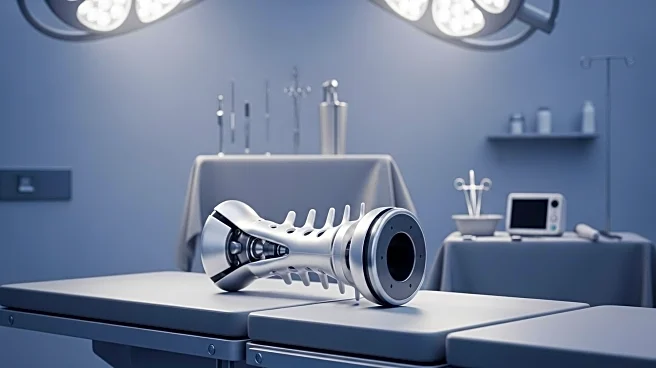What's Happening?
Intrinsic Therapeutics, Inc., a medical technology company, has announced the successful implantation of its Barricaid Annular Closure Device in patients undergoing awake spine surgery. This procedure, performed by Dr. Ernest E. Braxton Jr., a Board-Certified neurosurgeon in Vail, Colorado, marks a significant advancement in lumbar discectomy treatment. Awake spine surgery involves local and regional anesthesia, allowing patients to remain conscious and communicate with the surgeon during the operation. This approach facilitates real-time feedback and potentially reduces the risk of reherniation and the need for further surgeries. The Barricaid device aims to prevent reherniation in patients with large annular defects, offering a promising solution for those undergoing lumbar discectomy.
Why It's Important?
The introduction of the Barricaid device in awake spine surgery represents a pivotal shift in surgical practices, potentially improving patient outcomes and reducing healthcare costs. By avoiding general anesthesia, patients may experience faster recovery times and fewer complications, such as post-operative nausea and confusion. This innovation could lead to broader acceptance of awake spine surgery, encouraging more surgeons to adopt this technique. The Barricaid device's ability to reduce reoperations by 81% underscores its significance in enhancing the standard of care for lumbar discectomy patients, potentially benefiting thousands of individuals who suffer from spinal issues.
What's Next?
As the clinical acceptance of the Barricaid device grows, more surgeons may integrate this technology into their practice, expanding its use in awake spine surgeries. Intrinsic Therapeutics is likely to continue promoting the benefits of the Barricaid device, aiming to increase its adoption across various medical institutions. Further studies and trials may be conducted to validate its effectiveness and explore additional applications. The success of this procedure could inspire advancements in other surgical fields, encouraging the development of new techniques that prioritize patient comfort and recovery.
Beyond the Headlines
The adoption of awake spine surgery and the Barricaid device may influence ethical considerations in surgical practices, emphasizing patient autonomy and real-time communication during procedures. This approach could lead to a cultural shift in how surgeries are perceived, with a focus on minimizing invasive techniques and enhancing patient experience. Long-term, the success of such innovations may drive changes in medical training, encouraging new generations of surgeons to prioritize minimally invasive methods.








